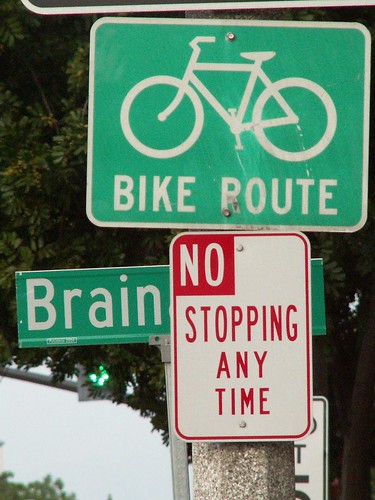 Rather than having deficits in attention, learners today seem to have surpluses of attention, in that we are constantly in search of compelling input. With our minds becoming accustomed to multi-sensory content, our brains seem unwilling to accept input on just one channel.
Rather than having deficits in attention, learners today seem to have surpluses of attention, in that we are constantly in search of compelling input. With our minds becoming accustomed to multi-sensory content, our brains seem unwilling to accept input on just one channel. Not that I'm the only one multitasking. More and more, my 'always on' brain has shared it's impatience with the computer. Rendering while downloading; installing while editing; burning while browsing... maybe more efficient computers are contributing to my rewiring? Remember when we had to have patience when installing from tape drives, or floppy disks?
Replay is only a click away in the random access world wide web; in my ipod's synchronous memory; in the auto-recording live feed of my personal video recorder. In relying on these technologies, I've even found myself pausing to rewind my own 'linear life' to the interesting bits.
A sad consequence of this multi-attentional state, is that I always feel like I'm missing out on something; when in fact, I'm missing out on everything! Trawling for captivating input through multiple 'channels', and relying upon 'rewind' as a form of memory, has limited my ability to be fully present to any singular experience.
Only the most engaging conversation or the most intellectually stimulating task, seem able to capture my full attention. Knowing that it is in attending to the nuances, that one truly captures the richness of life, I'm coming to realize that I'll have to make a more conscious effort to give my fullest attention to each individual person/event/task in order to appreciate its majesty!
Photo Credit: Gregory Marton




2 comments:
> "relying upon 'rewind' as a
> form of memory, has limited
> my ability..."
Welcome to my world. One of the negative impacts of my recognized severe disability is a problem transferring rapidly-presented information to longer-term memory. Another is difficulty retrieving information from longer-term memory that has managed to get there. I'm told that these significantly contribute to the fact that I was never academically successful despite repeatedly testing in the upper two percentile for IQ. With identification and accomodation while in school, I'm told that said intellectual potential could have been realized. Instead, it's like I'm serving a life sentence for something I was never guilty of. No matter how interested I may be in a subject and study it, retrieving that information when I want to engage in conversation is more frustrating than I can begin to explain.
For me, the ability to use a voice recorder and computer technology to supplement my memory makes a tremendous difference. That's not to say that it's easy or that it puts me on an even playing field. Or that society (even government) is prepared to acknowledge this kind of disability as readily as physical ones. But I would never want to have to return to the way that things were for me before the technology advanced this far.
Another perspective, for what it's worth.
quite interestingly, this is how i felt towards "classical" music (beethoven etc.) for long periods of my life. it was just too "information thin" for me to endure. this changed.
for opera, i was unable to overcome myself. i still long for 15min operas that condense all the plot to what's necessary and leave out all the loooooong dying sequences etc.
peter
Post a Comment